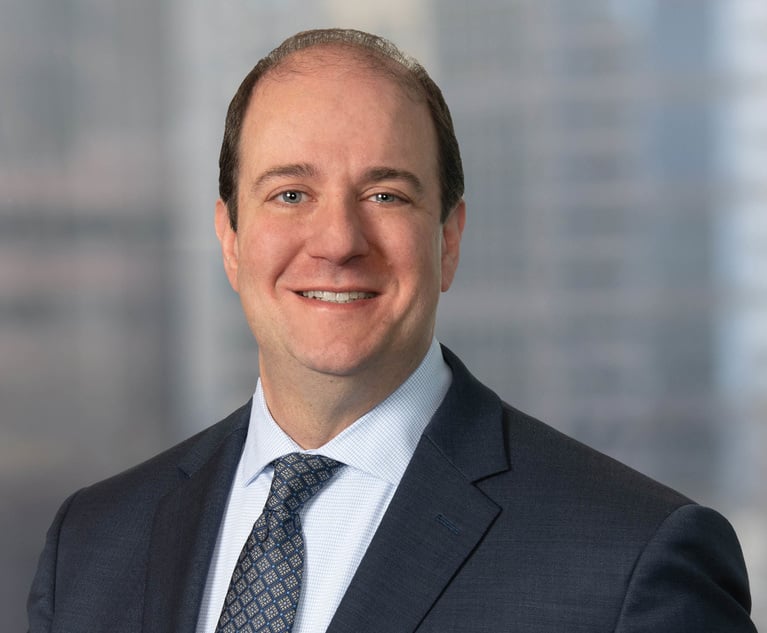A Matter of Punctuation?: Blank Rome, Andrus Wagstaff Spar Over Legal Fees in Pelvic Mesh Litigation
In a recently filed memorandum, Blank Rome contended that the use of periods and bullet points in the contract the two parties entered into clearly indicates that it is entitled to a flat 10% of the total increase it obtained for the mass tort firm.
April 10, 2020 at 04:33 PM
5 minute read
 Photo: Andrii Spy_k/Shutterstock.com
Photo: Andrii Spy_k/Shutterstock.com
The dispute between Blank Rome and mass tort law firm Andrus Wagstaff over nearly $500,000 in fees may hinge on punctuation.
The two firms are in a dispute over how much Colorado-based Andrus Wagstaff owes Philadelphia-based Blank Rome for helping the mass tort firm increase its common benefit compensation from the transvaginal mesh litigation.
Andrus Wagstaff is seeking summary judgment in the lawsuit, which Blank Rome filed in the U.S. District Court for the Eastern District of Pennsylvania in December, arguing that, based on the tiers delineated in the contract, Blank Rome is due only $178,500. But Blank Rome, which is also seeking summary judgment, has asked the court to award it more than $489,000 for allegedly helping Andrus Wagstaff increase its common benefit compensation award from $8.7 million to $13 million.
In a recently filed memorandum, Blank Rome contended that the use of periods and bullet points in the contract the two parties entered into clearly indicates that it is entitled to a flat 10% of the total increase it obtained for the mass tort firm.
"Significantly, Andrus Wagstaff's interpretation ignores a critical aspect of the contract language in question—its punctuation," Blank Rome's Frank Dante said in a response opposing Andrus Wagstaff's motion for summary judge filed Thursday. "Andrus Wagstaff's interpretation eliminates the use of periods in the provision, which clearly establishes that only one of the enumerated percentage levels is to be applied to the entire increase in Andrus Wagstaff's fee award. This deviation from basic rules of contract construction is fatal to Andrus Wagstaff's position."
The dispute stems from when a leadership committee of seven transvaginal mesh multidistrict litigation proceedings in the Southern District of West Virginia asked to set aside 5% of all settlements for common benefit fees. That request, which ultimately led to a federal judge granting $550 million in common benefit fees based on an estimated $11 billion in settlements, raised objections from a handful of the 94 law firms entitled to compensation, including Kline & Specter, Mazie Slater Katz & Freeman and Andrus Wagstaff. The firms argued they were entitled to more for the work they did in lawsuits against mesh manufacturers including Boston Scientific Inc. and Johnson & Johnson's Ethicon Inc. Some also accused the fee and cost committee's eight lawyers of allocating excessive fees to themselves.
Andrus Wagstaff claimed its preliminary allocation for common benefit work was unfair. Aimee Wagstaff, who was co-lead of the multidistrict litigation against Boston Scientific, cited one example where a member of the fee and compensation committee, Clayton Clark of Clark, Love & Hutson, requested his firm be paid $45.5 million, or more than $960 an hour, while he recommended her firm receive $8,715,000, which comes to nearly $295 an hour.
Andrus Wagstaff eventually entered into an agreement with Blank Rome so the Philadelphia-based firm could help with negotiations. Under an engagement letter, dated Nov. 9, 2018, Blank Rome agreed to discount its standard hourly rates by 25% but include an incentive fee payment that used a sliding scale based on the increase it was able to obtain. For instance, if Blank Rome got between $1 million and $2 million more, it was entitled to 3% of that increase.
Because it was able to obtain more than $4 million, Blank Rome was entitled to 10%, according to the contract's terms, the lawsuit says. The firm is also seeking interest since October.
Andrus Wagstaff, however, contended that the contract did not allow for a flat 10% cut of the increase, but rather, the increases were tiered, so Blank Rome would receive 3% on the first $2 million, 6% on the increase between $2 million and $4 million, and 10% on any amount of the increase over $4 million.
In its motion for summary judgment filed March 3, the Colorado firm argued its interpretation used all of the language in the contract, while Blank Rome's made some language a nullity. Andrus Wagstaff further argued that Blank Rome's interpretation was excessive as it would mean the firm was earning more than $4,100 per hour.
"In this case, what makes sense, what is fair, and what is reasonable, is defendant Andrus Wagstaff's proposed application of the contingency formula that was written by Blank Rome," Fineman Krekstein & Harris attorney Andrew Chirls said in the firm's summary judgment motion. "It is the only reading that makes sense."
Blank Rome, however, contended that the language of the contract clearly and unambiguously called for a flat 10% increase if the increase was greater than $4 million, and that the use of periods and bullet points dividing the different tiers of recovery and incentive clearly showed that only one incentive calculation was to apply for whatever the final level of increase ended up being. Regarding the excessiveness arguments, Blank Rome cited similar agreements that it said have been approved by Pennsylvania courts.
"Blank Rome's total fee of $582,340.953 represents only 12% of the total increase in Andrus Wagstaff's common benefit attorney's fee award," Dante said. "Clearly, then, Blank Rome's fee is not excessive."
Eastern District Judge Juan Sanchez is handling the case.
Chirls declined to comment for the story, and Dante did not returned a call seeking comment.
This content has been archived. It is available through our partners, LexisNexis® and Bloomberg Law.
To view this content, please continue to their sites.
Not a Lexis Subscriber?
Subscribe Now
Not a Bloomberg Law Subscriber?
Subscribe Now
NOT FOR REPRINT
© 2025 ALM Global, LLC, All Rights Reserved. Request academic re-use from www.copyright.com. All other uses, submit a request to [email protected]. For more information visit Asset & Logo Licensing.
You Might Like
View All

Law Firms Mentioned
Trending Stories
Who Got The Work
J. Brugh Lower of Gibbons has entered an appearance for industrial equipment supplier Devco Corporation in a pending trademark infringement lawsuit. The suit, accusing the defendant of selling knock-off Graco products, was filed Dec. 18 in New Jersey District Court by Rivkin Radler on behalf of Graco Inc. and Graco Minnesota. The case, assigned to U.S. District Judge Zahid N. Quraishi, is 3:24-cv-11294, Graco Inc. et al v. Devco Corporation.
Who Got The Work
Rebecca Maller-Stein and Kent A. Yalowitz of Arnold & Porter Kaye Scholer have entered their appearances for Hanaco Venture Capital and its executives, Lior Prosor and David Frankel, in a pending securities lawsuit. The action, filed on Dec. 24 in New York Southern District Court by Zell, Aron & Co. on behalf of Goldeneye Advisors, accuses the defendants of negligently and fraudulently managing the plaintiff's $1 million investment. The case, assigned to U.S. District Judge Vernon S. Broderick, is 1:24-cv-09918, Goldeneye Advisors, LLC v. Hanaco Venture Capital, Ltd. et al.
Who Got The Work
Attorneys from A&O Shearman has stepped in as defense counsel for Toronto-Dominion Bank and other defendants in a pending securities class action. The suit, filed Dec. 11 in New York Southern District Court by Bleichmar Fonti & Auld, accuses the defendants of concealing the bank's 'pervasive' deficiencies in regards to its compliance with the Bank Secrecy Act and the quality of its anti-money laundering controls. The case, assigned to U.S. District Judge Arun Subramanian, is 1:24-cv-09445, Gonzalez v. The Toronto-Dominion Bank et al.
Who Got The Work
Crown Castle International, a Pennsylvania company providing shared communications infrastructure, has turned to Luke D. Wolf of Gordon Rees Scully Mansukhani to fend off a pending breach-of-contract lawsuit. The court action, filed Nov. 25 in Michigan Eastern District Court by Hooper Hathaway PC on behalf of The Town Residences LLC, accuses Crown Castle of failing to transfer approximately $30,000 in utility payments from T-Mobile in breach of a roof-top lease and assignment agreement. The case, assigned to U.S. District Judge Susan K. Declercq, is 2:24-cv-13131, The Town Residences LLC v. T-Mobile US, Inc. et al.
Who Got The Work
Wilfred P. Coronato and Daniel M. Schwartz of McCarter & English have stepped in as defense counsel to Electrolux Home Products Inc. in a pending product liability lawsuit. The court action, filed Nov. 26 in New York Eastern District Court by Poulos Lopiccolo PC and Nagel Rice LLP on behalf of David Stern, alleges that the defendant's refrigerators’ drawers and shelving repeatedly break and fall apart within months after purchase. The case, assigned to U.S. District Judge Joan M. Azrack, is 2:24-cv-08204, Stern v. Electrolux Home Products, Inc.
Featured Firms
Law Offices of Gary Martin Hays & Associates, P.C.
(470) 294-1674
Law Offices of Mark E. Salomone
(857) 444-6468
Smith & Hassler
(713) 739-1250







